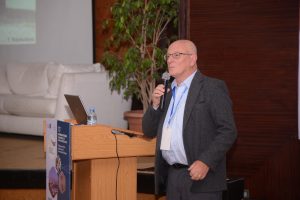
It was fantastic to participate in the recent 13th International Congress of the Orthopterists´ Society in Agadir, Morocco — the first to be held on the African continent. Around 250 members from around the world engaged in presentations and workshops surrounding the themes of integrated pest management, forecasting and monitoring, regional integration and collaboration, conservation, ecology, neurobiology and physiology, genomics, and taxonomy. Thank you to Professor Idrissi and the rest of the ICO organizers for their tremendous hard work to make ICO 2019 a major success!
We also had a great turnout and fruitful conversations at our GLI-hosted data management workshop at the conference. As part of the workshop, we asked our invited expert panel* what the most pressing challenges with regards to data management were, and what they saw as critical future directions to be implemented. Following this, GLI members commented and asked additional questions to the panel.
Major themes that were highlighted as critical at the workshop by panelists and other participating members included:
1) The need for data to be collected with a specific purpose in mind, which will inform how data is collected and where and how it is stored. Relatedly, the importance of not over-collecting data that is superfluous to the objectives at hand and which can be an added challenge for field officers.
2) A sensible meta-data system that documents changes made to database structure is critical to avoid data corruption over time.
3) Trust is a critical first step that must be in place before data can be streamlined and shared between institutions and governments.
4) Data is often scattered in different offices, or across different formats even within institutions, and is often not standardized into a single accessible database.
5) Data is often not georeferenced for various reasons and this is a barrier to integrating and accurately using it.
6) There are large gaps in data in many regions that are sorely needed for accurate modelling and forecasting (e.g. lack of weather stations, lack of locust surveys in remote areas, lack of biological information about locust species).
7) A growing body of citizen science data is available to be leveraged (e.g. missing weather data, presence/absence of locusts) but there is no consensus or standardized way to collect and integrate this data to data collected through more traditional means. Crowdsourced data also comes with its own unique quality control issues that must be dealt with.
8) Teaching and training is critical to ensure quality data collection in the field, and field technicians need to understand the importance and purpose of the data they are collecting to ensure the highest quality data.
These highlighted themes will provide fodder for upcoming workshops sponsored by the GLI, including our monitoring and forecasting workshop slated for March 30–April 3, 2020. We would love to have your feedback on what you feel are the critical areas to address moving forward with regards to data management in monitoring and forecasting. Please use this form for your responses.
*Expert Panel
Alex Latchininsky — FAO, Italy
Cyril Piou — CIRAD, France
David Hunter — Orthopterists’ Society
Dan Johnson — University of Lethbridge, Canada
Eduardo Trumper — INTA, Argentina
Kathleen King — USDA-APHIS-PPQ, Wyoming
Mohamed Abdallahi Babah Ebbe — CNLA Mauritania, INSAH Mali
Ted Deveson — Australian Plague Locust Commission



